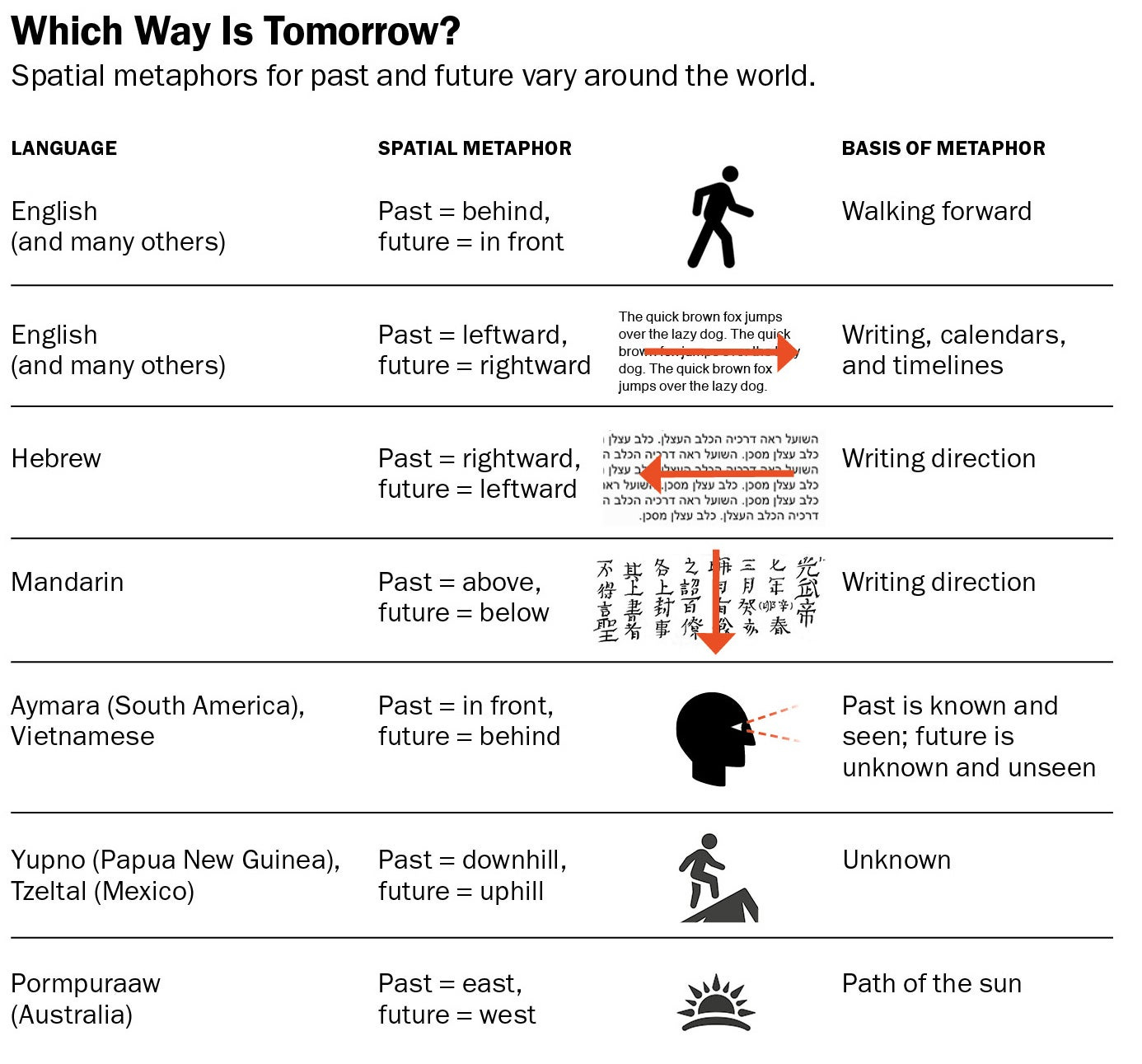Time is one of my favorite things. I cannot think of anything more abstract, maybe concepts like imagination or memory, equally fascinating, but time is different, in the sense that permeates everything we do, how we work, how we organize our days and live our life. It is almost impossible to ignore. It is also a central topic in art, mostly in cinema, and contemporary philosophy, in particular to the work of one of my favorite thinkers: Deleuze. I also love the devices made for timekeeping, in particular calendars, I even designed my own and wrote about it here.
Last week I mentioned that some of my favorite diagrams are the ones made to visualize time, today I want to share three reasons why I’m fascinated by time and a few accompanying diagrams.
1. Keeping time, a tale as old as time

Keeping time is essential to how we live our lives. Not only in our current times of meetings and calendar links, but keeping track of time is key for agriculture and social activities. The really long story of time keeping devices started with observing astronomical bodies, making obelisks, water, candles and incense clocks, sundials, astrolabes but apparently also with making marks on walls. Don’t quote me on this but it is possible to say that some of the oldest devices for timekeeping are diagrams. The oldest known calendar comes from the Yoruba people in West Africa and can be traced back to 8042 BCE(!).
The incredible amount of different calendars in many cultures suggests that we all thought keeping time was important and also that there isn’t one way of keeping time that is superior or better than all the others. It is highly contextual. I find it beautiful that a few of them agreed on the idea that a year has around 365 days.
There’s so much inspiration in how ancient cultures decided to structure their calendars. Including days for rest, dangerous days, days for rituals and days of three suggestions (lol, Saturday), lucky and unlucky days. The myths and cultures that shaped their days were embedded into how they structured their life, this makes me think and reflect on current notions of time where it seems like everyday is the same, and there are rarely days or seasons for rest, for avoiding activities or for changing perspectives.
2. Time is a consensus

Time being highly contextual and different for every culture is not helpful when you’re trying to set up a 1:1 over video chat, they knew this, so by an incredible feat of human coordination some protocol pilled people developed Coordinated Universal Time.
Time seems like an universal certainty mostly because of this, I cannot imagine a world where every country has their own hour, and this affects how we perceive and understand the abstraction of time. I doubt our modern conception of time as certain, unlimited, without beginning or end yet extremely accurate would exist without things like UTC.
We seem to understand time through that lens, through our perfect clocks and terrible calendar interfaces, and it matches also how we live: sometimes thinking our lives are endless because time is, or seem to be, endless. But it is not, at least not our time on Earth. My personal philosophy is to make the most out of everyday, and always focus on being intentional in how I spend my time, looking to always be doing things that will compound over time or that contribute to something meaningful.
3. Understanding time through metaphors
I’m fascinated by using spatial metaphors in order to define time. Probably because of my background in architecture I love thinking about space. Trying to orient ourselves in time by thinking of space seems so paradoxical (one intangible to understand another) yet makes so much sense. Most of our understanding of the world comes from experiencing and situating us and others spatially, and it is actually smart of us to make use of our existing knowledge of space in order to map time.
Language is relevant here. Whatever words we use to understand space are key in how we understand time. Thinking of past as right and left as future is the main metaphor used for calendar interfaces, for example, but it doesn’t stop there. Earlier times can be up, later can be down, as in generations: ascendants, descendants or the opposite as in “this upcoming week". It is highly flexible and contextual, and I love every time I catch myself or others using space to refer to time, or using lines to visualize future and past.
Finally, sharing this quote I love from Bertrand Russell’s analysis on the philosophy of Bergson. What I find interesting is thinking about what it means to create something new, and how time can be used to understand this: instead of repetition of eternal cycles, maybe the passage of time is an opportunity to always be creating something that has never existed before, this exact moment, the only thing that will ever exist, now.
That’s all for today! Thank you for reading and have an amazing week,
– Laura









